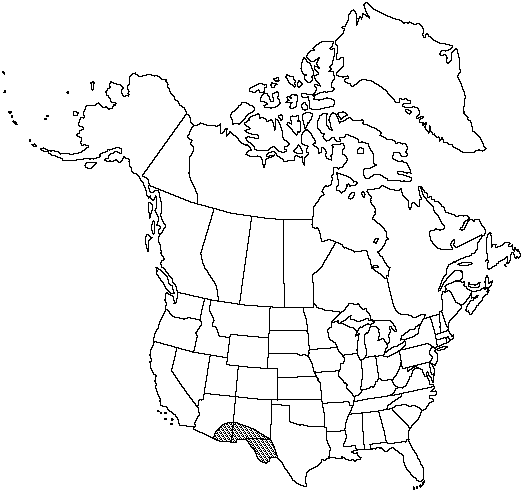Cheilanthes bonariensis
Bull. Inst. Jamaica, Sci. Ser. 5(1): 15. 1953.
Stems short-creeping to compact, usually 4–8 mm diam.; scales bicolored, with broad, well-defined, dark, central stripe and narrow, light-brown margins, narrowly lanceolate, slightly contorted, strongly appressed, persistent. Leaves clustered, 10–60 cm; vernation noncircinate. Petiole dark-brown, rounded adaxially. Blade linear, pinnate-pinnatifid throughout, 1–4 cm wide; rachis rounded adaxially, lacking scales, with dense monomorphic pubescence. Pinnae articulate at swollen, hirsute nodes, basal pair slightly smaller than adjacent pair, ± equilateral, appearing hirsute adaxially. Costae absent. Ultimate segments elongate-deltate to ovate, not especially beadlike, the largest 1–7 mm, abaxially densely tomentose, adaxially hirsute. False indusia marginal, weakly differentiated, 0.05–0.25 mm wide. Sori ± continuous around segment margins. Sporangia containing 32 spores. n = 2n = 90, apogamous.
Phenology: Sporulating summer–fall.
Habitat: Rocky slopes and ledges, found on a variety of substrates though rarely observed on limestone
Elevation: 1200–2400 m
Distribution

Ariz., N.Mex., Tex., Mexico, West Indies, Central America, South America
Discussion
Cheilanthes bonariensis has been assigned to Notholaena in past treatments. It is distantly related (at best) to the species here included in Notholaena, however, and we concur with R. M. Tryon and A. F. Tryon (1982) that it should be transferred to Cheilanthes. Chromosomal studies (G. J. Gastony and M. D. Windham 1989) suggest that C. bonariensis is an apogamous triploid that arose through autopolyploidy. Further investigation is necessary to determine whether 64-spored, sexually reproducing populations of C. bonariensis are still extant.
Selected References
None.